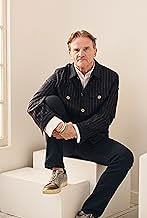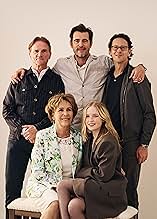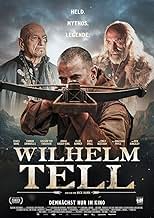The narrative unfolds in the 14th Century amidst the days of the Holy Roman Empire where Europe's nations fiercely vie for supremacy and the ambitious Austrians, desiring more land, encroach... Read allThe narrative unfolds in the 14th Century amidst the days of the Holy Roman Empire where Europe's nations fiercely vie for supremacy and the ambitious Austrians, desiring more land, encroach upon Switzerland, a serene and pastoral nation.The narrative unfolds in the 14th Century amidst the days of the Holy Roman Empire where Europe's nations fiercely vie for supremacy and the ambitious Austrians, desiring more land, encroach upon Switzerland, a serene and pastoral nation.
- Awards
- 1 nomination total
- Director
- Writers
- All cast & crew
- Production, box office & more at IMDbPro
Summary
Reviewers say 'William Tell' is lauded for its strong performances, stunning cinematography, and historical authenticity. The narrative of rebellion against tyranny resonates, though dialogue and pacing receive mixed feedback. Some find the script theatrical, and the middle section drags. Historical accuracy and character portrayals are debated. Despite these issues, the film's epic scope and emotional depth make it a compelling historical drama.
Featured reviews
I watched the world premiere of William Tell at the Toronto International Film Festival (2024).
The presenter of the festival had said before the movie, "they don't make movies like this anymore". I assumed that was a positive thing.
Unfortunately, it really wasn't. The biggest issue of the movie was the language used.
This is a 14th-century period piece that involved the Swiss and Austrians. But for whatever reason the dialogue was written in something that sounded like a high-schooler's approximation of Victorian English.
According to the director, he wrote the dialogue to have language unique to the film. Maybe to assist in some sense of believability within this world. Instead the film was often hard to follow. Character motivations were lost in the flowery, disjointed language.
That being said - the cast did their absolute best with the film. Golshifteh Farahani, Connor Swindells, Rafe Spall, and Ellie Bamber were standouts.
Don't go to see the film for Ben Kingsley - he was barely in it and his performance felt completely phoned in.
If you're okay with 2-hours of mindlessness as you watch beautiful scenery and cool fight scenes - I think there is enough to enjoy.
The movie set up a sequel. I do hope it can be made, and some changes to how dialogue and character interactions are done will be made.
The presenter of the festival had said before the movie, "they don't make movies like this anymore". I assumed that was a positive thing.
Unfortunately, it really wasn't. The biggest issue of the movie was the language used.
This is a 14th-century period piece that involved the Swiss and Austrians. But for whatever reason the dialogue was written in something that sounded like a high-schooler's approximation of Victorian English.
According to the director, he wrote the dialogue to have language unique to the film. Maybe to assist in some sense of believability within this world. Instead the film was often hard to follow. Character motivations were lost in the flowery, disjointed language.
That being said - the cast did their absolute best with the film. Golshifteh Farahani, Connor Swindells, Rafe Spall, and Ellie Bamber were standouts.
Don't go to see the film for Ben Kingsley - he was barely in it and his performance felt completely phoned in.
If you're okay with 2-hours of mindlessness as you watch beautiful scenery and cool fight scenes - I think there is enough to enjoy.
The movie set up a sequel. I do hope it can be made, and some changes to how dialogue and character interactions are done will be made.
William Tell is a new action adventure film directed and written by Nick Hamm, director of Driven and The Journey.
In the 14th century, the world is in a mess after the fall of the Roman Empire. Tyrannical rulers try to take as much land as possible and keep it under their control. The Austrian ruler also tries to keep Switzerland under his leadership.
The Swiss farmer William Tell (Claes Bang) helps a fleeing man from the corrupt Austrian power and thus starts a rebellious resistance against this tyranny. In the hope of getting enough support from others, they try to end this situation, in order to start a more fair rule.
Nick Hamm has experience as a director, but for this film adaptation of the Swiss legend of William Tell, he chose to write the story of the film independently for the first time. Unfortunately, he misses the mark, because he ended up with a messy film. Where he does not always seem to have been very clear about where exactly he wanted to go with the story. As a result, the story can sometimes be difficult to follow.
This is also because the film starts at a hurried pace, but then later slows down to a long-winded pace. In the smooth introduction, too many different problems and characters are introduced, most of which have their own storylines. Most of these storylines are more separate from each other and sometimes only overlap briefly, but these overlaps do not always have the same amount of use or real meaning.
You also do not get to know the many characters well enough to really care about most of them during the final battle. When people die during this battle, you do not always know exactly who has died and you also care little about most of the lost fighters.
Most of the fights are also a bit on the hurried, simple side, because William Tell quickly manages to eliminate most of his opponents. This sometimes happens with just an arrow, despite the armor that his opponents wear.
Due to the many, smooth introductions of characters, most actors do not really get a chance to make the characters their own. Some then deliver somewhat weak or exaggerated acting.
In the 14th century, the world is in a mess after the fall of the Roman Empire. Tyrannical rulers try to take as much land as possible and keep it under their control. The Austrian ruler also tries to keep Switzerland under his leadership.
The Swiss farmer William Tell (Claes Bang) helps a fleeing man from the corrupt Austrian power and thus starts a rebellious resistance against this tyranny. In the hope of getting enough support from others, they try to end this situation, in order to start a more fair rule.
Nick Hamm has experience as a director, but for this film adaptation of the Swiss legend of William Tell, he chose to write the story of the film independently for the first time. Unfortunately, he misses the mark, because he ended up with a messy film. Where he does not always seem to have been very clear about where exactly he wanted to go with the story. As a result, the story can sometimes be difficult to follow.
This is also because the film starts at a hurried pace, but then later slows down to a long-winded pace. In the smooth introduction, too many different problems and characters are introduced, most of which have their own storylines. Most of these storylines are more separate from each other and sometimes only overlap briefly, but these overlaps do not always have the same amount of use or real meaning.
You also do not get to know the many characters well enough to really care about most of them during the final battle. When people die during this battle, you do not always know exactly who has died and you also care little about most of the lost fighters.
Most of the fights are also a bit on the hurried, simple side, because William Tell quickly manages to eliminate most of his opponents. This sometimes happens with just an arrow, despite the armor that his opponents wear.
Due to the many, smooth introductions of characters, most actors do not really get a chance to make the characters their own. Some then deliver somewhat weak or exaggerated acting.
An adaptation of Friedrich Schiller's 1804 play of "Wilhelm Tell" and story of the Swiss struggle for independence. Where an act of oppression, followed by unnecessary wrongdoing sparks a response that sets off a chain of events that lead to rebellion. Wilhelm Tell, master of the crossbow, involved in a conflict he would have rather not be a part of..
Visually, the film delivers beautiful landscape shots and a believable period piece, with a nicely-colored and dynamic cinematography and an excellent production! Not to mention a rather large cast of actors that present the material with strong performances.
I've read questioning of the "dialogue", but as a foreigner, I found it was easy to follow at all times and no line particularly annoying or useless.
But.. despite this strong execution, the script lacks surprises, intrigue and excitement. Making the predictable plot an expected retelling of this known story.
Don't get me wrong, it is quite solid and engaging enough.. but for 2-hour film that feels a tad long, I expected something more. It's not what I wanted it to be, but I would recommend it still to those interested and those not familiar with the famous character.
Visually, the film delivers beautiful landscape shots and a believable period piece, with a nicely-colored and dynamic cinematography and an excellent production! Not to mention a rather large cast of actors that present the material with strong performances.
I've read questioning of the "dialogue", but as a foreigner, I found it was easy to follow at all times and no line particularly annoying or useless.
But.. despite this strong execution, the script lacks surprises, intrigue and excitement. Making the predictable plot an expected retelling of this known story.
Don't get me wrong, it is quite solid and engaging enough.. but for 2-hour film that feels a tad long, I expected something more. It's not what I wanted it to be, but I would recommend it still to those interested and those not familiar with the famous character.
Hmmm. Never before have I heard anyone proudly declare "We are Swiss" in quite such an underwhelming manner before, and that rather sums up the lacklustre performance of Claes Bang as the title character in this verbose crossbow chronology. Traumatised by his experiences in the Crusade, he's now not a natural rebel but is instead content to live peaceably with his wife and son. When he comes to the rescue of a stranger whose wife had just been raped and murdered by the occupying troops of the King of Austria (Sir Ben Kingsley) his former valiance is rekindled and releases all manner of hell on his unprepared, unarmed and unsuspecting people. Pursued by the maniacal "Gessler" (Connor Swindell) and his blonde henchman "Stussi" (Jake Dunn), he has to rediscover his skill with the arrow, and yes - there's the legendary scene with the apple and the boy's head! There is some stunning Alpine photography mingled in with the pretty obvious CGI, and to be fair to it there are plenty of action scenes as Tell and his rapidly increasing circle of friends proves to be quite adept at reducing their foes to wriggling corpses. Sir Ben has managed to fish out his eye patch from "The Last Legion" (2007) but like Sir Jonathan Pryce, he doesn't really feature enough to make much more than a few cameo appearances to add a little bit of Thespian gravitas to this rather sterile and flat history. The characters are really lacking in charisma in this film and the long-winded dialogue and charm-free efforts from all but, perhaps, Dunn - think a weedier version of "Stamper" from "Tomorrow Never Dies" (1997) just don't really resonate much at all. There's plenty of attention to the creative detail with the costumes and castles all fitting the bill nicely but it's probably half an hour longer than it needs to be and screams sequel at us at it's all rather rushed end.
The 2024 adaptation of William Tell arrives with grandeur in mind, positioning itself as a sweeping retelling of the legendary Swiss folk hero known for his defiance against tyranny and unmatched archery skills. The source material is rich, filled with tension, rebellion, and moral weight. Unfortunately, while this version boasts meticulous costuming and visual authenticity, the film itself proves to be an uninspired and emotionally muted experience that drags more than it compels.
From the opening scenes, it is clear that a significant amount of effort was poured into the look of the film. The costumes are easily one of the highlights. Each garment feels appropriately weathered and era-specific, transporting viewers into a believable medieval Alpine world. The armor, the peasants' clothing, and the noble attire all feel right, not just in terms of aesthetics but in their contribution to the sense of place and time. This level of authenticity suggests a production that took historical detail seriously, a commendable trait in any period film.
But the visuals cannot save what is otherwise a directionless and emotionally flat experience. The acting is consistently muted across the board. While restraint can often be a powerful choice in performance, especially in dramatic historical epics, the cast here often feels detached rather than intentional. William Tell, played by a well-known but oddly miscast lead, offers little in terms of emotional engagement. His performance is subdued to the point of seeming uninterested. Even in moments where righteous fury or internal conflict should dominate the screen, there is a quiet monotone that dulls what should be the pulse of the story.
Supporting characters fare no better. The villainous bailiff Gessler, who forces Tell to shoot an apple off his son's head, comes across more as a bureaucratic inconvenience than a terrifying symbol of oppression. And Tell's son, Walter, is particularly jarring. While the child actor speaks his lines clearly enough, the character feels like a transplant from a contemporary teen drama. He comes off as a whiny, modern-day, spoiled brat rather than a child raised in a time of oppression and hardship. His tone and behavior are out of step with the film's setting and drain any real gravity from the film's most iconic scene. Rather than evoking sympathy or concern, his presence often irritates, further weakening the emotional heart of the film.
If there is a single word that best describes the film's direction, it is aimless. The pacing is sluggish and the scenes often feel stitched together without momentum or narrative drive. Dialogue-heavy moments linger far too long, and action sequences-few and far between-are choreographed without urgency. Tension, which should build steadily in a story of resistance and personal courage, instead dissipates into long, quiet stares and slowly spoken monologues that offer little substance.
The script also bears responsibility for the film's failings. The dialogue is overly formal and lacks emotional punch. Characters speak in a kind of flattened Shakespearean dialect, which may have been intended to lend gravitas but instead sounds stilted and unnatural. There is an absence of internal conflict, personal stakes, or even basic emotional variation. The result is a story that is both unconvincing and unengaging.
The direction, or lack thereof, further exacerbates the film's weaknesses. Scenes are blocked in a way that feels static and stagey. Characters frequently stand still or walk in slow circles while delivering their lines, as though unsure of what to do. There is no clear visual language or thematic rhythm to guide the viewer. The camera work is competent, even beautiful at times, especially in wide alpine shots, but the cinematography never communicates anything deeper than surface-level beauty.
It is particularly disheartening because the legend of William Tell should not be this dull. This is a story of resistance against authoritarianism, of one man's courage and conviction challenging the rule of law and power. The famous apple scene is one of the most enduring symbols of precision and pressure in Western folklore, and yet here it passes with barely a pulse. The build-up is too long, the staging too clinical, and the aftermath too emotionally blank to do justice to what should be the film's most riveting moment.
Even the score, while serviceable, does not elevate the experience. There are moments when the music swells with the landscape, offering fleeting glimpses of grandeur, but more often than not it simply underlines the sluggish tempo rather than providing contrast or emotional cues.
To be fair, the filmmakers clearly had ambition. There is a reverence for the legend at play, and a clear attempt to treat the material seriously. But reverence alone does not make for compelling cinema. A myth as potent and symbolic as William Tell's demands energy, risk, and a sense of rebellion. This film plays it far too safe, choosing to meditate rather than ignite.
The final act attempts a return to narrative urgency but arrives too late. The resolution feels both rushed and unsatisfying, offering little payoff for the patience demanded throughout the preceding two hours. Characters who should experience transformation remain static. The revolution hinted at never fully materializes in any believable way. It ends with a whimper rather than a bang, and the audience is left not with a sense of triumph, but a question: what was the point?
In the end, William Tell (2024) is a missed opportunity. The craftsmanship is visible in its wardrobe and scenic backdrops, but the emotional core of the story is hollow. Its performances are subdued to the point of disengagement, and its direction lacks vision. A film with this much potential, based on such a powerful legend, should have stirred hearts and quickened pulses. Instead, it leaves viewers checking the time and waiting for something-anything-to happen.
For fans of historical costume dramas, the film might hold some visual appeal, but even those with patience for slow burns may find their endurance tested here. This version of William Tell is not without merit, but it ultimately forgets that the tale is one of bravery and defiance. What we get is a beautiful shell of a story, impeccably dressed but sadly empty inside.
From the opening scenes, it is clear that a significant amount of effort was poured into the look of the film. The costumes are easily one of the highlights. Each garment feels appropriately weathered and era-specific, transporting viewers into a believable medieval Alpine world. The armor, the peasants' clothing, and the noble attire all feel right, not just in terms of aesthetics but in their contribution to the sense of place and time. This level of authenticity suggests a production that took historical detail seriously, a commendable trait in any period film.
But the visuals cannot save what is otherwise a directionless and emotionally flat experience. The acting is consistently muted across the board. While restraint can often be a powerful choice in performance, especially in dramatic historical epics, the cast here often feels detached rather than intentional. William Tell, played by a well-known but oddly miscast lead, offers little in terms of emotional engagement. His performance is subdued to the point of seeming uninterested. Even in moments where righteous fury or internal conflict should dominate the screen, there is a quiet monotone that dulls what should be the pulse of the story.
Supporting characters fare no better. The villainous bailiff Gessler, who forces Tell to shoot an apple off his son's head, comes across more as a bureaucratic inconvenience than a terrifying symbol of oppression. And Tell's son, Walter, is particularly jarring. While the child actor speaks his lines clearly enough, the character feels like a transplant from a contemporary teen drama. He comes off as a whiny, modern-day, spoiled brat rather than a child raised in a time of oppression and hardship. His tone and behavior are out of step with the film's setting and drain any real gravity from the film's most iconic scene. Rather than evoking sympathy or concern, his presence often irritates, further weakening the emotional heart of the film.
If there is a single word that best describes the film's direction, it is aimless. The pacing is sluggish and the scenes often feel stitched together without momentum or narrative drive. Dialogue-heavy moments linger far too long, and action sequences-few and far between-are choreographed without urgency. Tension, which should build steadily in a story of resistance and personal courage, instead dissipates into long, quiet stares and slowly spoken monologues that offer little substance.
The script also bears responsibility for the film's failings. The dialogue is overly formal and lacks emotional punch. Characters speak in a kind of flattened Shakespearean dialect, which may have been intended to lend gravitas but instead sounds stilted and unnatural. There is an absence of internal conflict, personal stakes, or even basic emotional variation. The result is a story that is both unconvincing and unengaging.
The direction, or lack thereof, further exacerbates the film's weaknesses. Scenes are blocked in a way that feels static and stagey. Characters frequently stand still or walk in slow circles while delivering their lines, as though unsure of what to do. There is no clear visual language or thematic rhythm to guide the viewer. The camera work is competent, even beautiful at times, especially in wide alpine shots, but the cinematography never communicates anything deeper than surface-level beauty.
It is particularly disheartening because the legend of William Tell should not be this dull. This is a story of resistance against authoritarianism, of one man's courage and conviction challenging the rule of law and power. The famous apple scene is one of the most enduring symbols of precision and pressure in Western folklore, and yet here it passes with barely a pulse. The build-up is too long, the staging too clinical, and the aftermath too emotionally blank to do justice to what should be the film's most riveting moment.
Even the score, while serviceable, does not elevate the experience. There are moments when the music swells with the landscape, offering fleeting glimpses of grandeur, but more often than not it simply underlines the sluggish tempo rather than providing contrast or emotional cues.
To be fair, the filmmakers clearly had ambition. There is a reverence for the legend at play, and a clear attempt to treat the material seriously. But reverence alone does not make for compelling cinema. A myth as potent and symbolic as William Tell's demands energy, risk, and a sense of rebellion. This film plays it far too safe, choosing to meditate rather than ignite.
The final act attempts a return to narrative urgency but arrives too late. The resolution feels both rushed and unsatisfying, offering little payoff for the patience demanded throughout the preceding two hours. Characters who should experience transformation remain static. The revolution hinted at never fully materializes in any believable way. It ends with a whimper rather than a bang, and the audience is left not with a sense of triumph, but a question: what was the point?
In the end, William Tell (2024) is a missed opportunity. The craftsmanship is visible in its wardrobe and scenic backdrops, but the emotional core of the story is hollow. Its performances are subdued to the point of disengagement, and its direction lacks vision. A film with this much potential, based on such a powerful legend, should have stirred hearts and quickened pulses. Instead, it leaves viewers checking the time and waiting for something-anything-to happen.
For fans of historical costume dramas, the film might hold some visual appeal, but even those with patience for slow burns may find their endurance tested here. This version of William Tell is not without merit, but it ultimately forgets that the tale is one of bravery and defiance. What we get is a beautiful shell of a story, impeccably dressed but sadly empty inside.
Did you know
- TriviaDespite being a national hero in Switzerland, there is no concrete historical evidence that William Tell ever existed.
The earliest written account of the story appears in a 15th-century chronicle called the "White Book of Sarnen", more than a century after the events are supposed to have taken place.
Furthermore, the act of the hero shooting an apple from his son's head stems from the saga of Toko, who was a servant of the Danish King Harald Bluetooth, who died in 985. Likewise, Toko's story was written down more than two hundred years later, in the epic tale "Gesta Danorum".
Many historians view William Tell as a purely legendary figure, though his story was deeply embedded in Swiss national identity by the time of its writing.
- GoofsThe various castles are shown in their modern forms. Specifically, they have a large number of windows. These were all cut several centuries after the period in which the story is set, when castles were no longer required to be fortresses.
- ConnectionsVersion of Guillaume Tell et le clown (1898)
Everything New on Hulu in August
Everything New on Hulu in August
There's a whole lot to love about Hulu's streaming offerings this month — get excited for brand-new series premieres and film favorites to watch at home.
- How long is William Tell?Powered by Alexa
Details
- Release date
- Countries of origin
- Official site
- Language
- Also known as
- Guillermo Tell
- Filming locations
- Production companies
- See more company credits at IMDbPro
Box office
- Gross US & Canada
- $43,088
- Opening weekend US & Canada
- $26,554
- Apr 6, 2025
- Gross worldwide
- $680,624
- Runtime
- 2h 14m(134 min)
- Color
- Sound mix
- Aspect ratio
- 2.39 : 1
Contribute to this page
Suggest an edit or add missing content








































